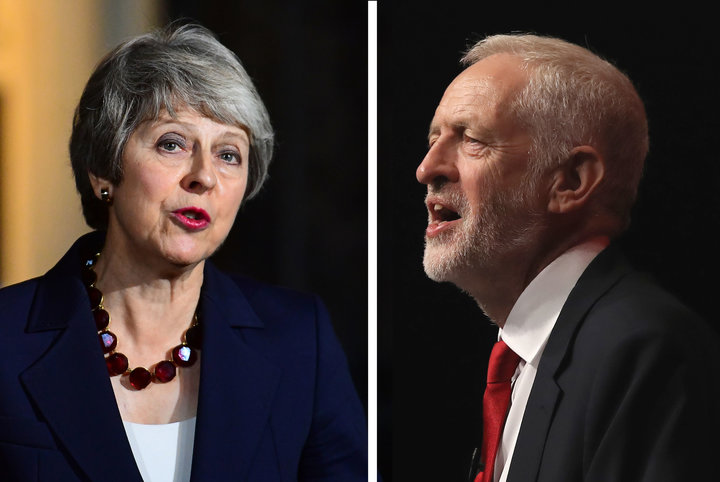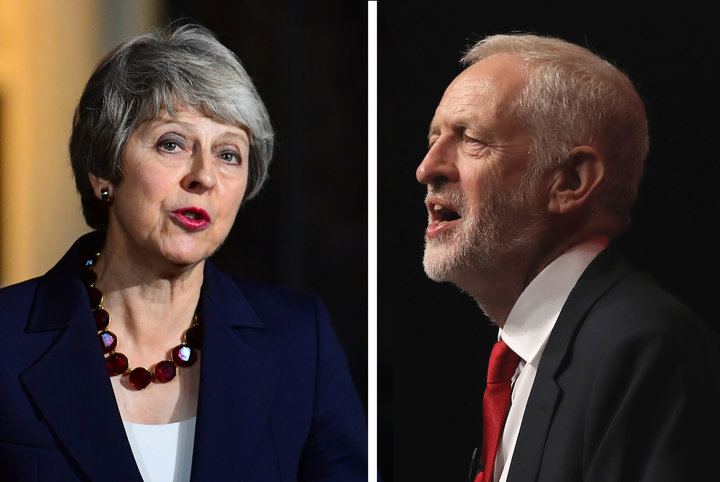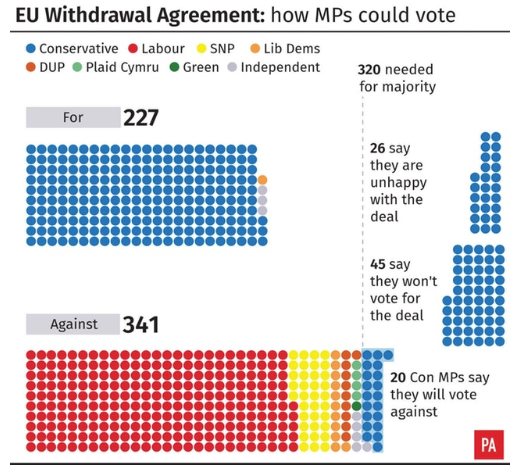
More than two years after the United Kingdom voted to leave the European Union, Brexit is almost here. Yet while the country is scheduled to depart on March 29, 2019, Britain is as divided over the issue as it ever has been.
Prime Minister Theresa May has agreed the terms of the ‘divorce’ with the leaders of the EU’s remaining member states, but lawmakers in the British parliament still have to approve the so-called Withdrawal Agreement.
In ordinary times, a Conservative government with a simple majority would be able to get the deal through the House of Commons with little fuss.
But these are extraordinary times. May cannot rely on the support from members of parliament in her own party – much less Northern Ireland’s Democratic Unionist Party (DUP), which has been propping up May’s minority government since her disastrous general election last year.

Press Association
As it stands, as May bizarrely takes her Brexit plan around the country as if on the election trail, no commentator in the country expects the prime minister to get enough support when MPs vote on December 11. The only question, it seems, is how heavily she is defeated.
Then what? That’s where things get more unpredictable, with the outcomes ranging wildly from the prospect of another general election to no Brexit at all.
Here’s your guide to what will be a historic week in British politics, however it ends.
What’s happening now?
On Tuesday, MPs began five days of debates ahead of what is described as the ‘meaningful vote’ on May’s Brexit deal.
The Withdrawal Agreement they are debating outlines the terms on which the UK will leave the EU and the desired future relationship. The vote is expected on December 11, but even that isn’t set in stone. Amendments have been tabled by two Labour MPs to extend the time for debate.
Will May get enough votes?
Probably not.
Some 20 Conservative MPs have said publicly they will vote against May’s deal, 45 have said they will not vote in favour and more than 20 have said they are unhappy with it. Their unease comes from, as they see it, the agreement aligning the UK too closely with the EU, and they claim May is set to deliver a Brexit in name only.
Given that May doesn’t have a majority in parliament, she will be relying on support from opposition parties. May’s minority government ally, the DUP, who usually vote with the government to help them pass legislation, has also expressed its own concerns with how the deal risks separating the island of Ireland from the mainland as a trading territory.
The Labour Party, the official opposition, has also declined to approve May’s Brexit deal, saying the have concerns about the impact on jobs and Northern Ireland.
The bottom line is this: the chance of the deal being approved with the simple majority of 320 of the 639 MPs eligible to vote is highly unlikely.
What are the amendments?
The vote – or votes – may not be limited to the terms of May’s deal. Labour has tabled an amendment outlining how MPs will “pursue every option” that prevents the UK leaving the EU on the terms of May’s deal or leaving without any deal at all.
Tory and Labour backbenchers have also put forward something similar, and there appears to be united front against the UK quitting the EU without any deal – or what is colloquially referred to as ‘crashing out’.
Indeed, on the first day of debates, MPs voted for a motion that means if May’s Brexit is voted down next week, MPs can effectively instruct ministers on what to do next and amend her “plan B” option.

Press Association
What happens if she wins the vote?
In the unlikely event that scores of MPs from across the political spectrum swing behind the embattled prime minister, it will allow the government to introduce the EU (Withdrawal Agreement) Bill to the Commons either before Christmas or after recess (the holiday for parliament), in January.
While no guarantee of the legislation passing, it would suggest an orderly procession towards the EU exit doors.
What happens if she loses the vote?
You would expect Theresa May’s premiership to be over, right? While that’s a likely outcome, it is not the only one. These are the most likely scenarios.
– She could try again
This would depend on the margin of her defeat.
The European Union has been adamant this is a ‘take it or leave it’ deal that cannot be renegotiated. But if faced with the threat of a calamitous no-deal Brexit and following a narrow Commons defeat, May might fancy testing their resolve and seeing if she can get at least some cosmetic changes to appease enough MPs to win a second vote.
– Theresa May quits
May herself has been adamant that she will stay on as prime minister regardless of the result. But a defeat by something in the order of 200 votes – which would represent a rebellion by scores of her own MPs – and it could be the most elegant way out.
– May forced out by a Conservative rebellion
Conservative MPs most strongly opposed to May’s deal have already failed to oust May, struggling to muster enough support to trigger a leadership battle two weeks ago. But once the vote is over, other disgruntled Tory politicians could make their move.
– Second referendum
Yes, taking the deal to the public is an option. May has ruled it out, and Labour has backed the idea – but only if they do not get a general election. It would possibly require an extension to the two-year timeframe to agree a Brexit deal, but even a senior Conservative has suggested another referendum could logistically be held by the end of May (the month, that is).
– May calls another general election
The ‘Hail Mary’ pass. The Prime Minister could hope that voters will – via the ballot box – back her plan. Her fellow Conservatives are anxious to avoid this route after the 2017 election resulted in a hung parliament and a resurgent Labour Party under Jeremy Corbyn.
– Labour tries to force an election
As the opposition, the Labour Party would have to win a vote of ‘no confidence’ in the prime minister in parliament. May would then be relying on the Conservatives to put together a government which could win a second vote of no confidence, and if not a general election would be called. It would mean the DUP and a clutch of Tory rebels would have to side with Corbyn, which seems unlikely.
– No-deal Brexit
A series of dire warnings, most grimly spelled out by the Bank of England, suggest the impact of leaving the EU without a deal on March 29 could be a disaster. Some Tory eurosceptics – dubbed the Brexiteers – say much of this is an exaggeration. But if everything else fails it’s possible that ‘crashing out’ could happen.
– No Brexit at all
The most unlikely prospect, but one given fresh momentum after the European Court of Justice indicated on Tuesday that the UK could simply change its mind and abandon Brexit – without needing the approval of the 27 other EU states. It would be wise not to rule anything out.







